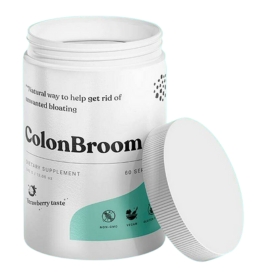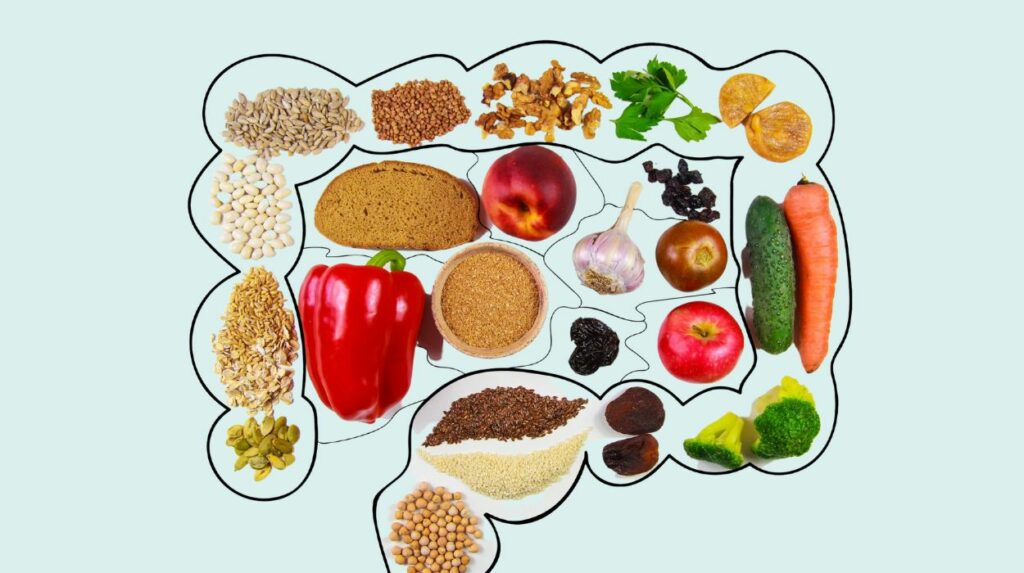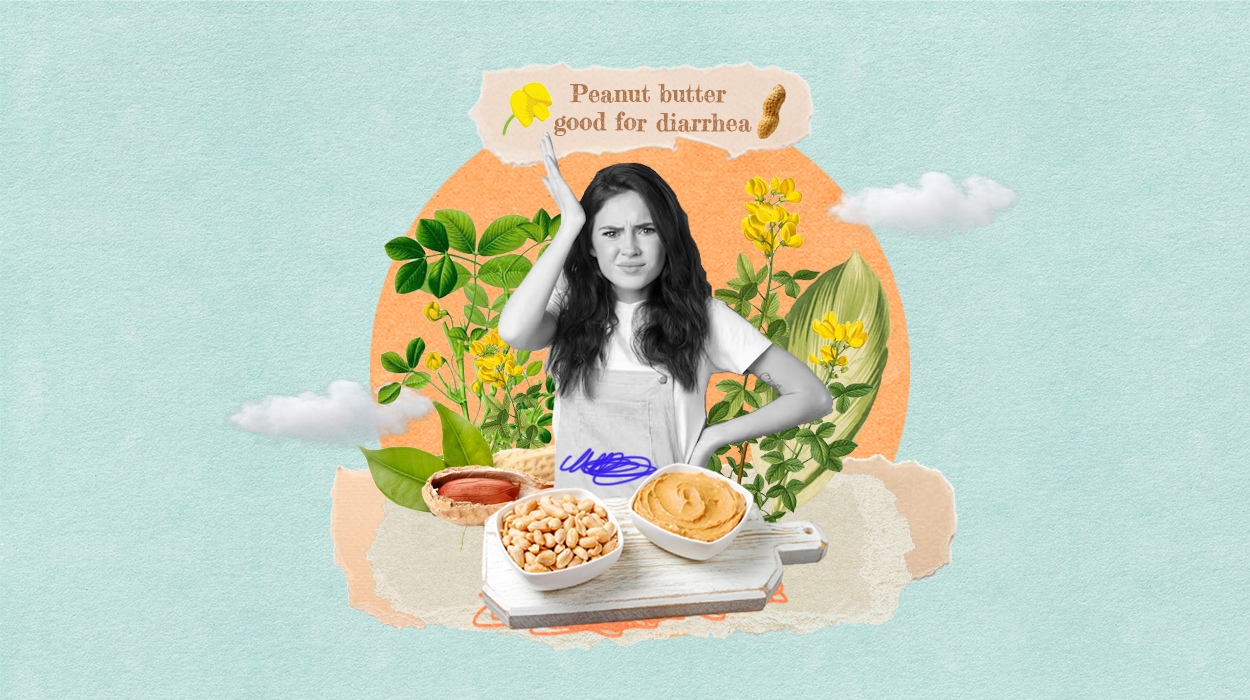Peanut butter is among the most popular spreads worldwide, offering delicious flavor and significant health benefits. Some eat peanut butter as part of their daily food intake. But when faced with digestive issues, its suitability might come into question.
Is peanut butter good for diarrhea? There’s long been a list of foods recommended to stop diarrhea. Some suggest avoiding bland foods, while others recommend probiotics to restore gut balance. But where does peanut butter stand?
Let’s look into this popular pantry staple and explore the impact of peanut butter on digestion.
Is Peanut Butter Good For Diarrhea?
Peanut butter’s high-fat content may exacerbate diarrhea symptoms in acute or mild cases. However, peanut butter can serve as a valuable source of nutrition for those grappling with digestive disorders or chronic diarrhea.
It’s always crucial to be attentive to how your body reacts to foods. If consuming peanut butter makes diarrhea worse, it’s wise to cut back and seek medical advice.
Does Peanut Butter Help With Diarrhea?
Peanut butter is considered a comfort food for its rich, creamy texture and satisfying taste. But when it comes to its role in managing diarrhea, its effectiveness varies from one person to another.
Peanut butter is relatively easy to digest for most people. It contains many functional compounds necessary for a healthy diet. Still, eating peanut butter when you have diarrhea is not commonly recommended. Eating too much peanut butter can worsen mild or acute diarrhea.
If bacterial infections or foodborne illnesses cause diarrhea, focusing on foods that bind loose stools is essential. With acute diarrhea, you’ll want to focus on rehydration therapy, which replaces lost fluids and electrolytes. Drink plenty of water and consider consuming liquids with electrolytes, such as:
- Caffeine-free soft drinks.
- Fruit juices.
- Sports drinks.
- Broths.
Featured Partner Offer

Colon Broom
- Reduces bloating and relieves constipation
- Improves general gut health
- Increases fiber intake
- Supports healthy cholesterol levels
- Promotes healthy circulation
Peanut Butter And Chronic Diarrhea
Dietary recommendations for those with chronic diarrhea differ from those with acute diarrhea. Older adults with chronic diarrhea or individuals with irritable bowel syndrome or IBS should follow a low-FODMAP diet. People with IBS have changing bowel movements, which leads to diarrhea sometimes.
The low fermentable oligosaccharides, disaccharides, monosaccharides, and polyols diet has been proven to resolve or reduce diarrhea in some individuals. FODMAps are a group of poorly absorbed carbohydrates in the small intestine. Reducing your intake of trigger foods can help improve digestive health and provide symptomatic relief in patients with chronic diarrhea.
Including gut-healing foods in your diet can significantly reduce gastrointestinal or GI symptoms. In its simplest form, peanut butter is made from dry roasted peanuts, salt, and oil. All of these ingredients are allowed on a low FODMAP diet.
Peanut butter is an excellent fat, protein, and dietary fiber source. It also contains essential vitamins and minerals, such as calcium, iron, and fatty acids. Peanuts provide high energy levels for lesser consumption levels, making them an energy-dense food. Since most peanut fat is heart-healthy monounsaturated fat, they are a viable option for those needing critical nutrients.
Chronic diarrhea is one of the most common GI conditions that impacts a patient’s nutritional status. Studies show an undeniable link between chronic gastrointestinal disorders and malnutrition. In these cases, specialized nutritional support is crucial to overall health. If you have chronic diarrhea and want to eat peanut butter, try a small amount to see your tolerance level. In case of discomfort, decrease the amount you consume or cut peanut butter from your diet.
Also, you’ll want to check labels carefully. Some brands add refined sugar and flavorings to enhance the taste of peanut butter, and these ingredients can add to triggers and make diarrhea worse. Work with a nutritionist to identify trigger foods and slowly adjust your diet.
Effects Of Peanut Butter On Digestion

Eating peanut butter has several effects on digestion due to its nutritional composition:
High In Fat: Peanut butter is a rich source of fat with its 50% monounsaturated fat content. The healthy fats in peanut butter take longer to digest than carbohydrates. This can positively impact some individuals, leaving your stomach fuller. However, some individuals may experience bloating and discomfort from the high-fat content. It has 14 grams of fat per 30-gram serving size.
Good Source Of Fiber: Peanut butter is a good source of dietary fiber, and this fiber content is mainly in an insoluble form.[7] Insoluble fiber can be excellent for adding bulk to the stool in healthy digestion and preventing and treating constipation. Although some recent studies showed that diarrhea could be prevented by a mixture of soluble and insoluble fibers, the treatment of already-existing diarrhea can be challenging. As there is a complex physiology with the interaction of many cells, molecular signals, and even microbiome, foods that have stimulating effects on bowels are better limited during acute periods of diarrhea.
Therefore, some authorities suggest the use of only soluble fibers in clinical diarrhea patients. However, at moderate levels and in combination with soluble fibers, pairing peanut butter (insoluble fiber) can be tolerable for those with diarrhea. So, it is better to listen to your body. A good example of mixing soluble and insoluble fiber is pairing a moderate amount of peanut butter with oat bread (soluble fiber).
It has 2 grams of fiber in a 30-gram serving.
Protein Content: Peanuts are also a good source of protein. They are the biggest source of the protein arginine and contain 20 amino acids. According to the Protein Digestibility Corrected Amino Acid Score, peanuts are nutritionally equivalent to meat and eggs for human growth and health. These proteins can aid muscle repair and growth when broken down in the stomach and digested in the small intestine.
Vitamins And Minerals: Niacin in peanut butter also helps convert food to energy and digestive system function. They make the list of healthy food options for diabetes because they contain magnesium, fiber, and heart-healthy oils that positively impact blood glucose.
Sugar And Additives: Some commercial peanut butter brands contain added sugar, salt, and preservatives. When consumed in large quantities, these can impact digestive health or lead to other health concerns.
For some people, moderate peanut butter consumption can be a nutritious addition to meals. However, others may have peanut allergy or sensitivity. You should closely observe your body’s response and consult with your healthcare professional if adverse reactions occur.
Alternative Choices
Here are some healthy peanut butter alternatives you may consider, but you should eat these nut butter choices also in moderation and watch how your body responds if you have diarrhea:
- Almond Butter: Almond butter contains slightly more fiber than peanut butter because it is made from ground almonds. While this can help with bowel regularity, its effects vary from one individual to the next. It has about 16 grams of fat per 33-gram serving.
- Sunflower Seed Butter: Sunflower seed butter is a healthy peanut butter alternative for those with nut allergies. It has 12 grams of fat per 32-gram serving. This might be the best low-fat choice of all the nut butter options.
- Pumpkin Seed Butter: Made from ground pumpkin seeds, pumpkin seed butter provides a different nutrient profile than peanut butter. It has a fat content similar to the other nut butter choices (13 grams per 28-gram serving).
Foods To Eat When You Have Diarrhea

- Soft fruits such as bananas, applesauce, and pumpkin.
- Cooked vegetables such as carrots and potatoes.
- Low-fiber starches such as white rice, toasted bread, and noodles.
- Scrambled eggs.
- Unseasoned baked chicken or turkey without skin.
- Bone broth.
- Decaffeinated tea.
- Oral rehydration solutions.
- Coconut water.
- Yogurt, kefir, or other probiotic foods.
Additionally, nutritional supplements may be necessary to avoid malnutrition. If diarrhea persists or certain foods make diarrhea worse, seek medical advice for more personalized recommendations.
Things To Avoid
There are several foods you should avoid if you’re looking for recommendations on how to stop diarrhea. The most common foods to avoid include:
- Alcoholic beverages.
- Drinks and foods containing caffeine.
- Greasy or fatty foods.
- Fried foods.
- High FODMAP foods. FODMAPs are fermentable carbohydrates consisting of oligosaccharides, disaccharides, monosaccharides, and polyols.
- Certain dairy products, such as milk, cheese, and ice cream (lactose-containing foods).
- High-fructose foods and drinks.
- Spicy foods.
- Diet drinks or sugarless gums and candies containing artificial sweeteners such as xylitol, sorbitol, and mannitol.
Conclusion
Peanut butter is a pantry staple included in many healthy diets. If you have diarrhea, peanut butter can worsen symptoms. Still, its rich nutritional profile of healthy fats, protein, vitamins, and minerals can improve the health of those who can tolerate it. It’s beneficial to start with small amounts and increase them according to your body’s response.
Balancing its intake with hydrating fluids and complementing it with other gentle foods can also help. As always, it’s crucial to listen to your body. Contact your healthcare provider for tailored guidance if diarrhea persists.
Frequently Asked Questions
If peanut butter toast does not worsen your symptoms, it may provide an excellent energy source for those with chronic diarrhea.
Peanut butter is not typically associated with constipation. However, its high fat and low fiber content can contribute to slower digestion.
Nuts, in general, are good for gastrointestinal health. Almond butter is an excellent dietary fat and protein source and is typically easily digestible. But it may exacerbate diarrhea in some patients.
Add bland and easy-to-digest foods to your toast. Some options include bananas, applesauce, scrambled eggs, plain yogurt, and avocado.
Peanut butter is not necessarily bad for diarrhea. Although its high fat content can worsen diarrhea in some patients, its nutritional benefits can be valuable for those with chronic or persistent symptoms.

